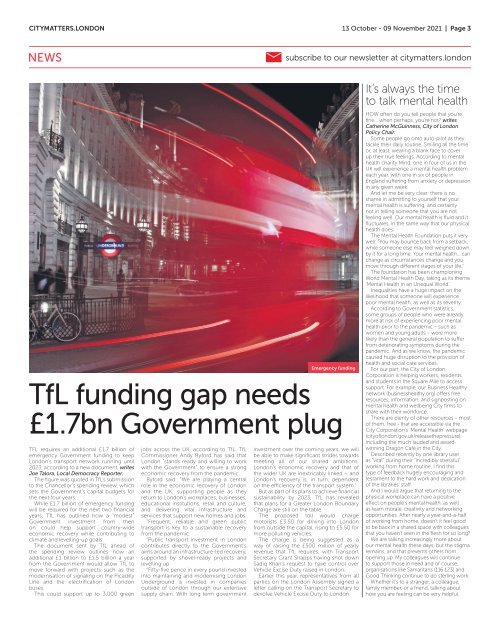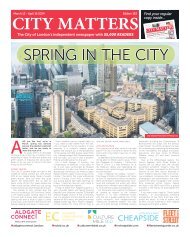City Matters 134
You also want an ePaper? Increase the reach of your titles
YUMPU automatically turns print PDFs into web optimized ePapers that Google loves.
CITYMATTERS.LONDON<br />
13 October - 09 November 2021 | Page 3<br />
NEWS<br />
subscribe to our newsletter at citymatters.london<br />
TfL funding gap needs<br />
£1.7bn Government plug<br />
TFL requires an additional £1.7 billion of<br />
emergency Government funding to keep<br />
London’s transport network running until<br />
2023, according to a new document, writes<br />
Joe Talora, Local Democracy Reporter.<br />
The figure was quoted in TfL’s submission<br />
to the Chancellor’s spending review, which<br />
sets the Government’s capital budgets for<br />
the next four years.<br />
While £1.7 billion of emergency funding<br />
will be required for the next two financial<br />
years, TfL has outlined how a “modest”<br />
Government investment from then<br />
on could help support country-wide<br />
economic recovery while contributing to<br />
climate and levelling-up goals.<br />
The document sent by TfL ahead of<br />
the spending review outlines how an<br />
additional £1 billion to £1.5 billion a year<br />
from the Government would allow TfL to<br />
move forward with projects such as the<br />
modernisation of signaling on the Picadilly<br />
Line and the electrification of London<br />
buses.<br />
This could support up to 3,000 green<br />
jobs across the UK, according to TfL. TfL<br />
Commissioner Andy Byford has said that<br />
London “stands ready and willing to work<br />
with the Government” to ensure a strong<br />
economic recovery from the pandemic.<br />
Byford said: “We are playing a central<br />
role in the economic recovery of London<br />
and the UK; supporting people as they<br />
return to London’s workplaces, businesses,<br />
educational institutions, retail and culture,<br />
and delivering vital infrastructure and<br />
services that support new homes and jobs.<br />
“Frequent, reliable and green public<br />
transport is key to a sustainable recovery<br />
from the pandemic.<br />
“Public transport investment in London<br />
contributes directly to the Government’s<br />
aims around an infrastructure-led recovery,<br />
supported by shovel-ready projects and<br />
levelling up.<br />
“Fifty-five pence in every pound invested<br />
into maintaining and modernising London<br />
Underground is invested in companies<br />
outside of London through our extensive<br />
supply chain. With long term government<br />
Emergency funding<br />
investment over the coming years, we will<br />
be able to make significant strides towards<br />
meeting all of our shared ambitions.<br />
London’s economic recovery and that of<br />
the wider UK are inextricably linked – and<br />
London’s recovery is, in turn, dependent<br />
on the efficiency of the transport system.”<br />
But as part of its plans to achieve financial<br />
sustainability by 2023, TfL has revealed<br />
that plans for a Greater London Boundary<br />
Charge are still on the table.<br />
The proposed toll would charge<br />
motorists £3.50 for driving into London<br />
from outside the capital, rising to £5.50 for<br />
more polluting vehicles.<br />
The charge is being suggested as a<br />
way of raising the £500 million of yearly<br />
revenue that TfL requires, with Transport<br />
Secretary Grant Shapps having shot down<br />
Sadiq Khan’s request to have control over<br />
Vehicle Excise Duty raised in London.<br />
Earlier this year, representatives from all<br />
parties on the London Assembly signed a<br />
letter calling on the Transport Secretary to<br />
devolve Vehicle Excise Duty to London.<br />
It’s always the time<br />
to talk mental health<br />
HOW often do you tell people that you’re<br />
fine... when perhaps, you’re not? writes<br />
Catherine McGuinness, <strong>City</strong> of London<br />
Policy Chair.<br />
Some people go onto auto-pilot as they<br />
tackle their daily routine. Smiling all the time<br />
or, at least, wearing a blank face to cover<br />
up their true feelings. According to mental<br />
health charity Mind, one in four of us in the<br />
UK will experience a mental health problem<br />
each year, with one in six of people in<br />
England suffering from anxiety or depression<br />
in any given week.<br />
And let me be very clear: there is no<br />
shame in admitting to yourself that your<br />
mental health is suffering, and certainly<br />
not in telling someone that you are not<br />
feeling well. Our mental health is fluid and it<br />
fluctuates, in the same way that our physical<br />
health does.<br />
The Mental Health Foundation puts it very<br />
well: “You may bounce back from a setback,<br />
while someone else may feel weighed down<br />
by it for a long time. Your mental health… can<br />
change as circumstances change and you<br />
move through different stages of your life.”<br />
The foundation has been championing<br />
World Mental Health Day, taking as its theme<br />
‘Mental Health in an Unequal World’.<br />
Inequalities have a huge impact on the<br />
likelihood that someone will experience<br />
poor mental health, as well as its severity.<br />
According to Government statistics,<br />
some groups of people who were already<br />
more at risk of experiencing poor mental<br />
health prior to the pandemic – such as<br />
women and young adults – were more<br />
likely than the general population to suffer<br />
from deteriorating symptoms during the<br />
pandemic. And as we know, the pandemic<br />
caused huge disruption to the provision of<br />
health and social care services.<br />
For our part, the <strong>City</strong> of London<br />
Corporation is helping workers, residents<br />
and students in the Square Mile to access<br />
support. For example, our Business Healthy<br />
network (businesshealthy.org) offers free<br />
resources, information, and signposting on<br />
mental health and wellbeing <strong>City</strong> firms to<br />
share with their workforce.<br />
There are plenty of other resources – most<br />
of them, free - that are accessible via the<br />
<strong>City</strong> Corporation’s ‘Mental Health’ webpage<br />
(cityoflondon.gov.uk/releasethepressure),<br />
including the much lauded and awardwinning<br />
Dragon Café in the <strong>City</strong>.<br />
Described recently by one library user<br />
as “vital” during their “incredibly stressful”<br />
working from home routine, I find this<br />
type of feedback hugely encouraging and<br />
testament to the hard work and dedication<br />
of the libraries’ staff.<br />
And I would argue that returning to the<br />
physical workplace can have a positive<br />
effect on people’s mental health, as well<br />
as team morale, creativity and networking<br />
opportunities. After nearly a year-and-a-half<br />
of working from home, doesn’t it feel good<br />
to be back in a shared space with colleagues<br />
that you haven’t seen in the flesh for so long?<br />
We are talking increasingly more about<br />
our mental health these days, but the stigma<br />
remains, and that prevents others from<br />
opening up. My colleagues will continue<br />
to support those in need and of course,<br />
organisations like Samaritans (116 123) and<br />
Good Thinking continue to do sterling work.<br />
Whether it’s to a stranger, a colleague,<br />
family member, or a friend, talking about<br />
how you are feeling can be very helpful.

















